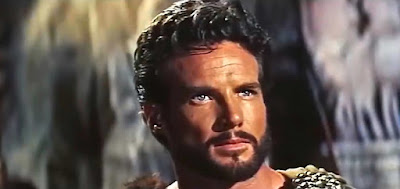 |
| Todd Armstrong |
JASON AND THE ARGONAUTS (1963). Director: Don Chaffey.
With a crew of brave and adept champions, including the mighty Hercules (Nigel Green), Jason (Todd Armstrong) sets sail on the Argo to the ends of the earth in an attempt to find the famous golden fleece. Jason is unaware that he has been sent on this journey by his hated enemy, Pelias (Douglas Wilmer), who only wants him out of the way. Also accompanying Jason is Pelias' conniving son, Acastus (Gary Raymond), and Argos (Laurence Naismith), the ship's builder. Jason has been granted several wishes by Hera, queen of the Gods (Honor Blackman) and she greatly enjoys stymying the plans of her husband Zeus (Naill MacGinness). But can even Hera help Jason overcome the incredible challenges he faces?
 |
| The humongous Talos bears down on the Argo |
These challenges, brought to life by the stop-motion wizardry of Ray Harryhausen (possibly his greatest achievement), include the gigantic bronze statue of Talos, which comes to life; tormenting harpies on an island paradise; the many-headed, slithering hydra; the clashing rocks, which would destroy the Argo were it not for the help of a very huge Poseidon; and the living and armed skeletons of the hydra's victims in the bravura climax.
Jason is also graced with a rich and exciting score by Bernard Herrmann, excellent production values, skillful photography by Wilkie Cooper; and often stunning costuming and art direction to boot. In fact,
Jason looks almost as good as MGM's
Captain Sindbad.
 |
| Jason confronts the gods of Olympus |
The actors are also well-chosen. Todd Armstrong makes the perfect Jason. Although he had a perfectly good speaking voice which you can hear in other movies he made, he is dubbed as Jason. Nancy Kovack is also dubbed as Medea, who falls in love with Jason and vice versa when he rescues her from the sea. Blackman, MacGinnes, Naismith, Raymond, Green, Wilmer -- as well as John Cairney as the young and ill-fated Nylas and Jack Gwillim as King Aeetes -- all give flavorful and adept performances. Sadly
Jason was not the big box office hit it deserved to be because people confused it with one of the ever-proliferating Italian "peplum" movies of the period when it was on a much, much higher level. The film did not do much good for the career of handsome Armstrong, who tragically committed suicide at 55.
Verdict: Jason and the Argonauts gets my vote as the greatest classic fantasy film ever made. ***1/2.






















